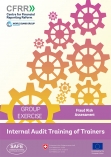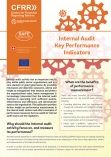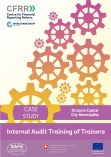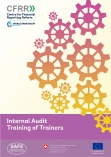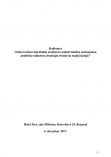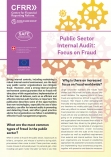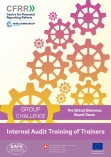The Centre provides knowledge services and capacity development assistance. Services include analytical and advisory services, learning and skill development, know-how and knowledge transfer, and technical assistance and institutional strengthening. All CFRR publications are available on this site.
Group Exercise: Fraud Risk Assessment
Teaching material | 2018
This group exercise further builds on the facts presented in the practical case study “Orotavia Capital City Municipality”, that is used throughout the Internal Audit Training of Trainers modules and aims to enhance participants knowledge about performing fraud risk assessments by following a structured framework including elements of fraud risk identification, assessment, and response.
Internal Audit Key Performance Indicators
Publication | 2018
It is important for an Internal Audit function to put in place performance metrics to measure its effectiveness, boost its value proposition and enhance credibility via-a-vis stakeholders. This publication provides insight on performance measurement in the internal audit in public sector context and offers examples of performance measures that can useful for internal audit teams and regulators.
Case Study: Orotavia Capital City Municipality
Teaching material | 2017
The case study Orotavia was developed to facilitate the Internal Audit Training of Trainers workshops and simulates a capital city municipality. The case study is the core teaching resource during the Fundamentals and Advanced Internal Audit Training of Trainers modules and workshops and provides an opportunity to bridge the gap between theory and the practical application of International Standards for the Professional Practice of Internal Auditing (ISPPIA) while also assisting to develop soft skills such as communication, working as a team and problem solving.
Internal Audit Training of Trainers Training Modules
Teaching material | 2017
The document provides a detailed overview of the Internal Audit Training of Trainers program including the Fundamental and Advanced modules as well as the timing and format of the sessions. The training session workshops have two streams: (i) Fundamentals stream with many practical case studies based on the simulated internal audit case designed for the less experienced practitioner; and (ii) Advanced stream for the more seasoned internal auditor with a narrower focus and more involvement in more complex areas.
Internal Audit Training of Trainers Training: KJS Case Study
Teaching material | 2017
The KJS case study was developed to facilitate the Internal Audit Training of Trainers workshops and simulated an organization that is a beneficiary of public funds in the Republic of Serbia. The case study is an additional teaching resource during the Fundamentals and Advanced Internal Audit Training of Trainers modules and workshops.
Internal Audit Training of Trainers Training: JLS-city XX Case Study
Teaching material | 2017
The JLS-city XX case study was developed to facilitate the Internal Audit Training of Trainers workshops and simulated auditing a JLS-city XX with over 200,000 inhabitants located in central Serbia. The case study is an additional teaching resource during the Fundamentals and Advanced Internal Audit Training of Trainers modules and workshops.
Public Sector Internal Audit: Focus on Fraud
Publication | 2017
Strong internal controls, including maintaining a robust internal control environment, are the best way public sector organizations can mitigate fraud. However, even a strong internal control environment cannot guarantee that no frauds will take place within organizations. Implementation of further lines of defense, such as an efficient and effective internal audit function, is important.
The Internal Audit Ethical Dilemmas Board Game
Teaching material | 2017
Developed to facilitate the Internal Audit Training of Trainers program, the objective of the Ethical Dilemmas Board Game is to enable participants to approach professional ethics training and education in a practical way, by analyzing threats that arise and selecting an appropriate course of action in line with the fundamental principles of the Code of Ethics for Internal Auditors prescribed by the Institute of Internal Auditors (IIA). The game is expected to develop participants' ethical decision-making skills and to make sound judgments when resolving and mitigating ethical dilemmas.

